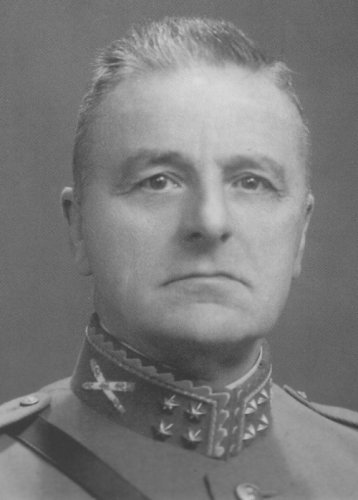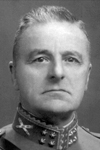Holland Overwhelmed in a Five-Days Campaign
The War Illustrated, Volume 2, No. 38, Page 548, May 24, 1940.
War broke on Holland shortly before dawn on Friday, May 10, and by the evening of the following Tuesday, May 14, the Dutch Commander-in-Chief had decided that further resistance was useless and the "Cease Fire" was sounded. Germany's war machine, so long prepared and employed with such ruthless efficiency, had destroyed the independence of yet another of the countries of Europe.
When the avalanche of fire and steel swept over the Dutch frontier from Germany shortly before dawn on Friday, May 10, the advanced troops of the Netherlands Army gradually retired according to pre-arranged plan. Their task was to hinder, not to hold positions which it was generally agreed were militarily indefensible. So, fighting with that stubborn tenacity which has ever characterized their race, the Dutch machine-gunners and riflemen withdrew to the first line of defence just in front of the rivers Yssel and Maas.
The Germans were hot in pursuit with forces far superior in number and far better supplied with guns, and by nightfall the battle was joined along the two rivers, while the German parachutists who had been landed from 'planes and transports were converting the interior of Holland into a welter of confused battle. That night the Germans, having overrun the "Maastricht Appendix", made the passage of the Maas and entered the town itself. Shortly afterwards, owing to one of the two bridges having escaped destruction by the defenders, they crossed the Albert Canal and so gained a foothold in the Belgian defensive positions.
This same day (Saturday) the Germans managed to effect the crossing of the Yssel below Arnhem, while their troops, landed by air and from the sea in the vicinity of Rotterdam, continued in a determined effort to capture that great centre of Dutch commercial life. The Dutch seemed, however, to have the position well in hand, and General Winkelman, the Commander-in-Chief, declared in an order of the day issued that night to his troops that "the German invasion of Holland has been a failure, and the German High Command has made a profound mistake in underrating the Dutch Army".
Already, however, the situation had taken a turn for the worse. By Sunday morning the Germans had crossed the Yssel and Maas in several places, and the Dutch, after destroying as many bridges as possible, were withdrawing to their "waterline" – the flooded area in front of what is called "fortress Holland", the triangle formed by the three cities of Amsterdam, Utrecht and Rotterdam. Practically the whole of northern Holland had been overrun by the invaders, who had made their appearance on the eastern shore of the Zuyder Zee and from Harlingen were threatening the great dam which connects Friesland with the province of North Holland. Far more serious was the German advance westward from Nymegen, which had the effect of cutting off the main Dutch forces from those operating in the south of Holland, and, of course, the Belgians and their Franco-British Allies.
So black was the outlook on the Monday morning (May 13) that no surprise was caused by the announcement that Princess Juliana and, later, Queen Wilhelmina, had taken refuge in England. Soon they were followed by the Dutch Government, which had found it impossible to function in a country involved in total war. By now the German advance through North Brabant has become a rush; their armoured cars had appeared at Langstraat, and they had taken by treachery the vital Moerdyk Bridge which crosses the Hollandische Diep connecting North Brabant with South Holland, the very heart of the country. The Germans claimed, indeed, that their advanced detachments had made contact with German troops fighting in Rotterdam.
Twenty-four hours later Gen. Winkelman announced that Dem Halder, the northern point of the province of North Holland and a main military base, was still in Dutch hands, and, so, too was Rotterdam; the position in Brabant was uncertain, but Zeeland was still held.
It was now Tuesday afternoon, and the situation was grave in the extreme. "Fortress Holland" was almost surrounded, and was being attacked simultaneously from land, sea and air. Rotterdam was bombed furiously in the course of the afternoon, and Utrecht was threatened with similar destruction; both cities surrendered a few hours later. It was hardly surprising, then, that early in the evening Gen. Winkelman ordered his troops to cease fighting, and by 7 p.m. the order had been obeyed.
At 1 o'clock in the morning of May 14, the Netherlands Legation in London announced the news.
The Commander-in-Chief of the Netherlands Army has issued a proclamation to the troops concerned that fighting is to cease.
Enemy troops in great numbers have succeeded in crossing the Moerdyk Bridge and in retaking Rotterdam, which had been previously heavily bombarded. Consequently the heart of the country was laid open to the enemy and the main forces of the army behind the Dutch waterline were threatened by immediate enemy attacks on their rear.
Under these circumstances, and to avoid complete destruction of the country, the C.-in.-C. was of the opinion that further resistance had become useless and therefore was to be abandoned.
So Holland's five-day campaign ended.
Index
Previous article
'War With All Our Might'
I say to the House, as I said to the Ministers who have joined this Government, I have nothing to offer but blood and toil and tears and sweat. We have before all of us an ordeal of the most grievo
Next article
'Day by Day Come Stories of Matchless Courage'
After long months of waiting the R.A.F., on the invasion of the Low Countries by the Nazis, was called on to play its vitally important part. Here are a few of what the Air Ministry itself described a





